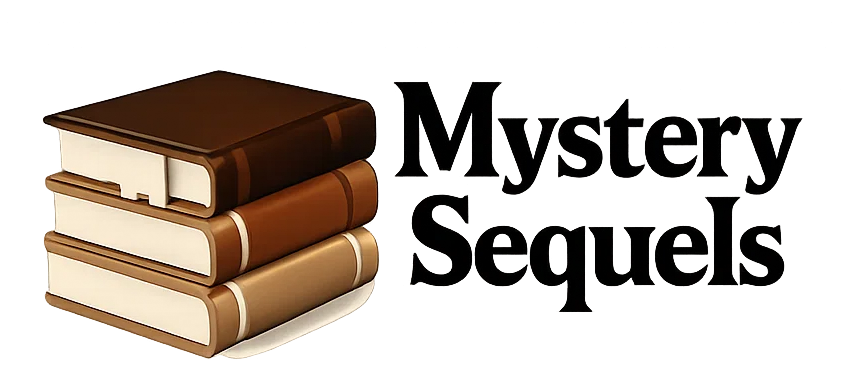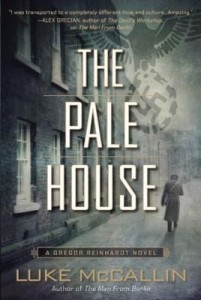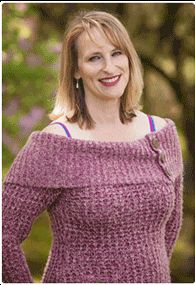Interview With Author Luke McCallin
 Having read and reviewed The Pale House not long ago, I enjoyed it so much that I’ve been looking for interviewing the author on my crime mystery site.
Having read and reviewed The Pale House not long ago, I enjoyed it so much that I’ve been looking for interviewing the author on my crime mystery site.
The Pale House is the second book in the Gregor Reinhardt historical thriller series, and it focuses on Gregor, a German intelligence officer during the Second World War who has been promoted to Feldjaegerkorps, a very powerful military police branch, with the main task for him being to oversee the German’s retreat through Yugoslavia, in Sarajevo.
Gregor Reinhardt is quite the character, and I’m planning on reading the rest of the books in the series soon. In the meantime, I hope you will enjoy the interview with Luke McCallin.
1. What inspired you to write the Gregor Reinhardt series and why did you choose this particular setting/time in history?
It may sound clichéd, but Gregor Reinhardt walked into my dreams one night, said hello, and then sat quietly to one side for months and years, not saying much, not doing much, just waiting for me to find the time and the courage to start writing his story.
Setting his story in the Balkans was actually a late decision. The novels were originally to be set in Berlin, a city I’ve never visited and about which I know practically nothing. I spent years trying to research it, until I had something of a road to Damascus moment and Sarajevo, where I was working, offered itself up as a location instead. Immediately, so many things fell into place.
The story made more sense, I could say so much more about the themes I wanted to develop. I could entice readers with the promise of adventure in the Balkans, a part of the world known to most as a by-word for intrigue, or treachery, so it was a chance to show readers another side of that region. It was also to make readers more keenly interested in the characters. They’d have to be tough or resourceful to survive the Balkans, right?!
It was also because I think that with mysteries, time and place are almost characters in and of themselves. I spent six years working in Bosnia, and you can’t live there, or in Sarajevo, for long without it seeping into you. As much as it’s an overused analogy, Bosnia really is a historical and cultural crossroads, and it’s so contested.
It defies any simple explanation, just like the finest puzzle or book or question. No matter the need to reduce and simplify it, there’s no one way to read it or play it, and a place and time like that gives you so many options as an author, for drama, action, reflection, for asking big questions and trying out the answers to them.
The time of the Second World War is also one that fascinates me, when the fates of individuals—or the ability of individuals to decide their fates—were cast into the fire. We like to think there is not much we cannot control, but in fact the raw edges to life are closer to us than we like to think. Not only that, but all a person can be can not only be undone and brought to nothing, but warped away from what that person might have been.
2. I have just finished reading The Pale House, the second book in the series. How many novels will the series include?
Here’s where I’m tempted to say ‘as many as the publisher will let me write and that fans want to read…!’ More seriously, though, my original conception of Reinhardt’s stories was a trilogy, each novel focusing on a particular underlying theme. The Man From Berlin was about redemption. The Pale House was about resistance. The third novel will be about reconciliation.
I know there are at least half a dozen stories, including the two I’ve written so far, that contain specific things I want to say about Reinhardt the character, and his times and places. Places are very important to me. I think that might come from my own background, growing up in Africa, and my work with the UN. I’m fascinated by places, what they can do to you.
So the third novel in the series to come will be set in post-WWII Berlin. That novel will complete the initial Reinhardt trilogy.
The fourth novel will be set in Reinhardt’s past, during the First World War, and will tell the story of an investigation in the trenches. I’ve always wanted to write a WWI novel, and I think Reinhardt will let me say some of the things I’ve always wanted to say about it. I’ve ideas for novels in pre-WWII Paris, in Marseille, in Berlin, and even an idea for a Reinhardt novel in Panama!
3. Tell us a bit more about Gregor Reinhardt. Why him?
Gregor Reinhardt is a German intelligence officer, a former Berlin detective chased out of the police by the Nazis. When you first find him in The Man From Berlin, he is haunted by what he has seen, tortured by recurring nightmares, wearing the uniform of an army he despises, and with ever fewer reasons to live.
He is a son, a soldier, a husband, a father, a friend, a policeman, a patriot… He is all of those things, and not defined by one of them more than another. He is a man formed by his times. He is a man much like any other. Sometimes strong, sometimes weak. Sometimes able to do the right thing, and sometimes too scared to. Sometimes shaped by events, sometimes able to shape them to him.
Sometimes introspective to the point of paralysis, but with the intelligence to see past the veil of illusion and propaganda that has been pulled across his time, and thus perfectly aware how his inactivity and fear make him complicit in the spiral of chaos around him.
Someone once said they would cross the road to talk to Henry V, or King Lear, but they wouldn’t cross the room to talk to Hamlet. I like to think Reinhardt’s a bit like that. He’s Hamlet. You wouldn’t think much to look at him, but there’s depths to Reinhardt. He feels his times very keenly. He feels his own inadequacies more keenly still. What I wanted to do in creating and writing Reinhardt was to find a way to look at a tempestuous and tendentious period of history, to create a character and make people think that he could be you.
An ordinary man in extraordinary times, still trying to behave and believe in what makes sense, but so painfully aware of his own fears and limitations, and still knowing what is right and what is wrong. If you give someone like that an opportunity to do something, be someone, what would he do? What would you do…?
So, if you crossed that proverbial room—maybe at a reception or a cocktail party—if you got him to loosen up and talk to you, if he trusted you enough, he’d have quite a bit to say about himself, and his times. I think you would find him interesting. Somewhat taciturn, with a dry sense of humour and very self-depreciating, and I think you would find yourself opening up to him, in turn.
4. What challenges did you face while writing the series so far?
It was not so much a question of could I do this—I had a degree of confidence in myself as a storyteller and a writer—but should I do this. What I was trying to write could so easily have been misunderstood as an apology. The time, the place, a character such as Reinhardt—a German, a soldier, a servant, however unwilling of a regime such as the Nazis—when what I was trying to get at was the human aspect of one man caught between choices.
A challenge I am finding now, though, is the research needed for the third novel. For the first two, I did not have a formal research process as I wrote. I knew a lot already, what I did not know I found easily enough, but post-war Berlin is lot already, what I did not know I found easily enough, but post-war Berlin is another matter altogether.
5. Is being an author a full time job for you?
No. Not yet. And I’m not sure I’d want it to be. I know that I get a lot of inspiration from my work. For sure, Reinhardt’s stories would not have been the same without my own personal experiences working with people affected by war in Bosnia, or Chechnya, or Gaza, or disaster in Pakistan, or Haiti after the earthquake.
I do a job I love, in an organisation that is aspirational, with people from all around the world, and every day brings something new. My wife does similar work to me. So do most of my friends. It’s a source of renewal and of great pride and satisfaction, and I think I would turn away from that at my peril. I do sometimes dream of giving it all up to write. Who wouldn’t?! There may come a time I’ll do just that, but it’s not yet.
6. Tell us a bit more about yourself.
I was born in Oxford to parents that had a humanitarian vocation. We moved to Africa when I was five. My father worked for the UN High Commissioner for Refugees, and my mother did work with child soldiers. That upbringing was inspirational, and engendered in me a desire to something similar. I’ve worked for a range of UN organisations around the world, and now work for the UN, based in Geneva.
For sure, all the places I worked and lived in—in Africa, in Russia, in Haiti, in Pakistan, in the Balkans—taught me something, or I saw something, or felt something. About what happens to people—ordinary people—put in extraordinary situations. Right now, watching the news from Ukraine, I get awful flashbacks to my time in Bosnia, to when neighbours turned on each other.
Trying to understand what makes people do that. What makes friends of decades suddenly believe the worst of each other? What makes a delivery man become a gunman? What makes a woman arm her husband or son and send him out to fight the sons and husbands of other women?
I’ve found that no amount of work we, as humanitarian workers, can ever really do will suffice to overcome those impulses. You are always going to be frustrated in what you achieve, to only get halfway to where you want to be, and often—far too often—the guilty get away with it. I think with my writing I’m trying to find some way of coming to terms with that. I don’t write about white knights on white horses—Gregor Reinhardt is certainly not one of those—but I try to ask those questions that seem to haunt me, and I try to find answers, and a sense of closure.
7. Who are your favorite authors and what genre do you read most?
Oh, gosh, where to start! Right, easiest bit first: apart from crime fiction, I read literature with an historical slant or focus, I love science fiction and fantasy, and I read a lot of history and current affairs.
For the authors… Harper Lee, Erich Maria Remarque, Vasily Grossman, Alexander Solzhenitsyn and Isaac Babel were great influences. Cormac McCarthy and Peter Mattheisen I find are extraordinary modern American writers.
Sebastian Barry has to be the reincarnation of an Irish bard, his writing is so lyrical. Rosemary Sutcliffe’s books (she always said she wrote for children aged eight to eighty!) about Roman Britain were magical. Hilary Mantel, Patrick O’Brien and Alexander Fullerton I love for the sheer depth of their historical research and, particularly for O’Brien, the sheer beauty of his writing and, in Aubrey and Maturin, one of the best fictional double-acts ever.
In science fiction and fantasy, Tolkien was everything to me, with CS Lewis, Stephen Donaldson, Neal Stephenson, William Gibson, and Larry Niven and Jerry Pournelle not far behind. I love all the world-building that goes into science fiction and fantasy, the intricacy of it. Right now, my favourite authors writing in fantasy are Scott Lynch, who writes about a lovable thief who gets into increasingly deep water, and R. Scott Bakker, who is writing an extraordinarily dark fantasy in a world that bears strong resemblance to the Middle East of antiquity.
As much as I read a lot of history and current affairs, I don’t have a particular favourite writer of it—I tend to focus on periods, more than authors—but AJP Taylor was, and remains, immensely readable. Joe Sacco’s graphic novels about Palestine, Goražde, and WWI are works of art as well as works of political analysis and conscience. Jared Diamond’s Guns, Germs and Steel changed the way I look at the world. Hew Strachan’s work on the First World War is magisterial.
The Washing of the Spears and Bury My Heart at Wounded Knee are classics that look at different instances of the imperial experience. The Isles is the single best book I know about Britain.
Right now, I’m reading a lot of crime, espionage and mystery, partly to familiarise myself as this was never the genre I thought I would write in! There are the giants like Raymond Chandler, James Ellroy, Len Deighton and John Le Carré. Then the modern authors I’ve discovered I like are Philip Kerr, William Ryan and Alan Furst, as well as David Downing. I really respect his attention to detail, although sometimes it seems like he’s swallowed the collected 1930s European train timetables! Seeing as I’m fascinated by what places and times can do to you, I especially like James McClure’s Kramer and Zondi series, about a pair of detectives in apartheid South Africa.
8. What other interests and hobbies do you have apart from writing?
I love playing rugby and squash. I fancy myself a bit of a goalkeeper, and keep goal for the UN football team! I’m one of the trainers for my son’s football team, and there’s nothing more refreshing after a day at work and nothing better for putting things in perspective than keeping two dozen over-excited under-12s occupied and happy! I love going for runs especially when I’m tired of writing, or have a block of some kind.
Some of my best thoughts or solutions have come on a run, and some of my best running times have been me getting home fast enough not to forget whatever great idea I’d come up with!
9. Any advice you have for aspiring mystery writers? If there is one thing they should really do (or avoid doing), what would that be?
The one thing a writer should do is write, and not to be afraid to write badly, or with difficulty because, as someone once told me, there are no good writers, there are only good re-writers. Just write. Don’t wait for the perfect idea, or the most ingenious plot. Don’t be afraid to show what you’ve done, and show it widely. Writing is a lonely business, so it’s mportant that you as a writer get out and about, and that you show your work to people, as many people as you can.
You want criticism, and you want that exposure of yourself and your work. Don’t be afraid to ask for help. There’s all kinds of resources out there: workshops, writers’ groups, online courses and coaches. Make friends with writers so that you have a community. I benefitted enormously from an online coach, who taught a great course on plot development.
Read outside your genre and comfort zone, and read widely and voraciously because you’ll never know what you might find, and where you’ll find it. Myself, I’ve got all kinds of books all over the place. I’ve just finished Neal Stephenson’s Anathem (amazing novel, but you know you’re only getting about a third of what he’s telling you!), and I’m reading Jonathon Littel’s The Kindly Ones, Reza Aslan’s Zealot, Mike Hulme’s Why We Disagree About Climate Change, and Timothy Morton’s Hyperobjects, which is a book that really really makes you think about the world when it’s not tying your brain in knots…
Two other things I’d add are observation and planning. When you’re out and about, watch people. Watch them having conversations, watch them walking down the street, eating, laughing. Watch the sky, watch the play of light on water or glass, watch the street’s reflection wash over the yellow chassis of a New York taxi. Watch how water flows, what it flows around, how it flows around.
When you’re planning, remember there’s a fine line between planning, and planning as prevarication. I used to just dive in and write, but what I’d end up with were lots of disconnected scenes and ideas. Sometimes I’d be able to join them up, often not. Planning—research, plotting, a synopsis, knowing the ending before you begin—can really help.








When will the 4th book on Gregor Reinhardt be published?
I have truly enjoyed the first three books and like and respect the fictional person of Gregor
Do you have any idea when Luke Mc Callin will publish the 3rd book in the trilogy? Good writer, interesting character he has created. Thank you.
It should be out this December with the title The Divided City.